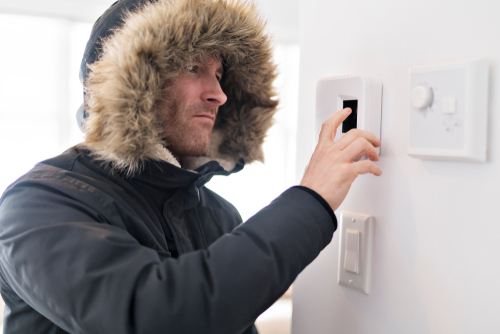As winter’s icy grip tightens around the country each year, facilities managers face the challenge of preparing heating systems to withstand severe cold temperatures. A proactive approach to preventative maintenance is crucial in ensuring the reliability, efficiency, and longevity of heating systems.

The objective is not merely to address issues as they arise but to identify and rectify potential problems before they escalate. In the context of severe cold, the stakes are higher, making a proactive stance essential for uninterrupted heating performance.
Conduct a Pre-Winter Inspection
Ideally, a thorough inspection of the entire heating system prior to temperatures dropping is best. Examine boilers, furnaces, heat pumps, and associated components for signs of wear, corrosion, or damage. Pay attention to the condition of heat exchangers, pipes, and valves. Identifying and addressing issues at this stage prevents breakdowns during the peak of winter.
Clean and Calibrate Controls
Controls play a pivotal role in regulating heating systems. Clean and calibrate thermostats, flame sensors, and other controls to ensure accurate temperature readings and efficient operation. Verify the responsiveness of safety controls to preemptively address any malfunctions that could compromise system safety.
Check and Replace Filters
Air and fuel filters are susceptible to accumulating debris and contaminants, which can impede airflow and lead to reduced efficiency and potential system malfunctions. Regularly check and replace filters to maintain optimal airflow and combustion. This will help maintain proper air quality and ensure that the system doesn’t have to work harder than necessary to heat the facility. This simple yet impactful step contributes to energy efficiency and prolongs the life of heating equipment.
Inspect Vent Systems
Proper venting is crucial for combustion heating systems. Inspect venting systems to ensure they are free from obstructions, corrosion, or leaks. Address any issues promptly to prevent the buildup of harmful gases, such as carbon monoxide, which poses a serious safety risk. For electric systems, regular inspection of electrical components is essential. Check for loose connections, damaged wiring, or any signs of wear that could compromise the system’s safety and efficiency. Addressing these issues promptly can prevent electrical failures, especially when the demand for heating is high.
Evaluate Insulation and Seals
Assess the insulation around pipes, ducts, and valves to prevent heat loss and ensure efficient energy utilization. Additionally, inspect door and window seals to eliminate drafts that could compromise the effectiveness of the heating system. Proper insulation contributes to maintaining a consistent and comfortable indoor temperature.
Test Emergency Shutdown Systems
Facility heating systems should be equipped with emergency shutdown systems for safety. Regularly test these systems to verify their functionality. Promptly address any malfunctions or anomalies to uphold the safety protocols necessary in the event of an emergency.
Keep Ductwork Clean
Regularly inspecting and cleaning ductwork is often overlooked but can significantly impact heating system performance. Accumulated dust and debris in ducts can obstruct airflow, making the system less efficient. Periodic cleaning helps maintain optimal airflow and ensures even heating throughout the facility.
Implement Predictive Maintenance Techniques
If possible, incorporate predictive maintenance techniques. Utilize sensors, data analytics, and predictive modeling to anticipate potential issues before they manifest. Predictive maintenance not only enhances reliability but also minimizes downtime and lowers overall maintenance costs.
Maintain Optimal Thermostat Settings
Monitoring thermostat settings is essential to prevent unnecessary strain on the heating system. Adjusting the temperature according to occupancy patterns and utilizing programmable thermostats can optimize energy usage and extend the lifespan of the equipment.
Review and Update Emergency Plans
In the face of severe cold, having comprehensive emergency plans is imperative. Review and update emergency procedures, including protocols for equipment failure, extreme weather events, and evacuation if necessary. Ensure that all relevant personnel are familiar with these plans to facilitate a swift and coordinated response in critical situations.
Educate Facility Staff
Empower facility staff with knowledge about heating systems, preventive measures, and emergency response protocols. Conduct training sessions to familiarize staff with the operation of heating equipment, recognize potential issues, and report abnormalities promptly. A well-informed team enhances the overall resilience of the facility.
Schedule Professional Inspections
While internal inspections are valuable, working with a professional technician for periodic inspections is equally crucial. Trained experts can identify hidden issues, conduct in-depth assessments, and provide recommendations for optimizing system performance. Schedule professional inspections at least once a year before the onset of severe cold to address potential vulnerabilities.
Resilient Heating Infrastructure for Winter Challenges
When winter descends with its biting cold, facilities managers can navigate the challenges by implementing a robust preventative maintenance strategy. From meticulous inspections to embracing technological advancements, each measure contributes to fortifying heating systems against severe cold temperatures.
By prioritizing proactive care, facilities managers not only ensure uninterrupted heating during the winter but also extend the lifespan of equipment, reduce energy costs, and enhance the overall safety and comfort of the facility.
By implementing a proactive approach, facilities can avoid costly breakdowns and ensure optimal performance during harsh winter conditions.
Jamie Tuinstra is a regional sales manager at Modine Manufacturing Co., a global thermal management solutions provider headquarter in Racine, Wis.
